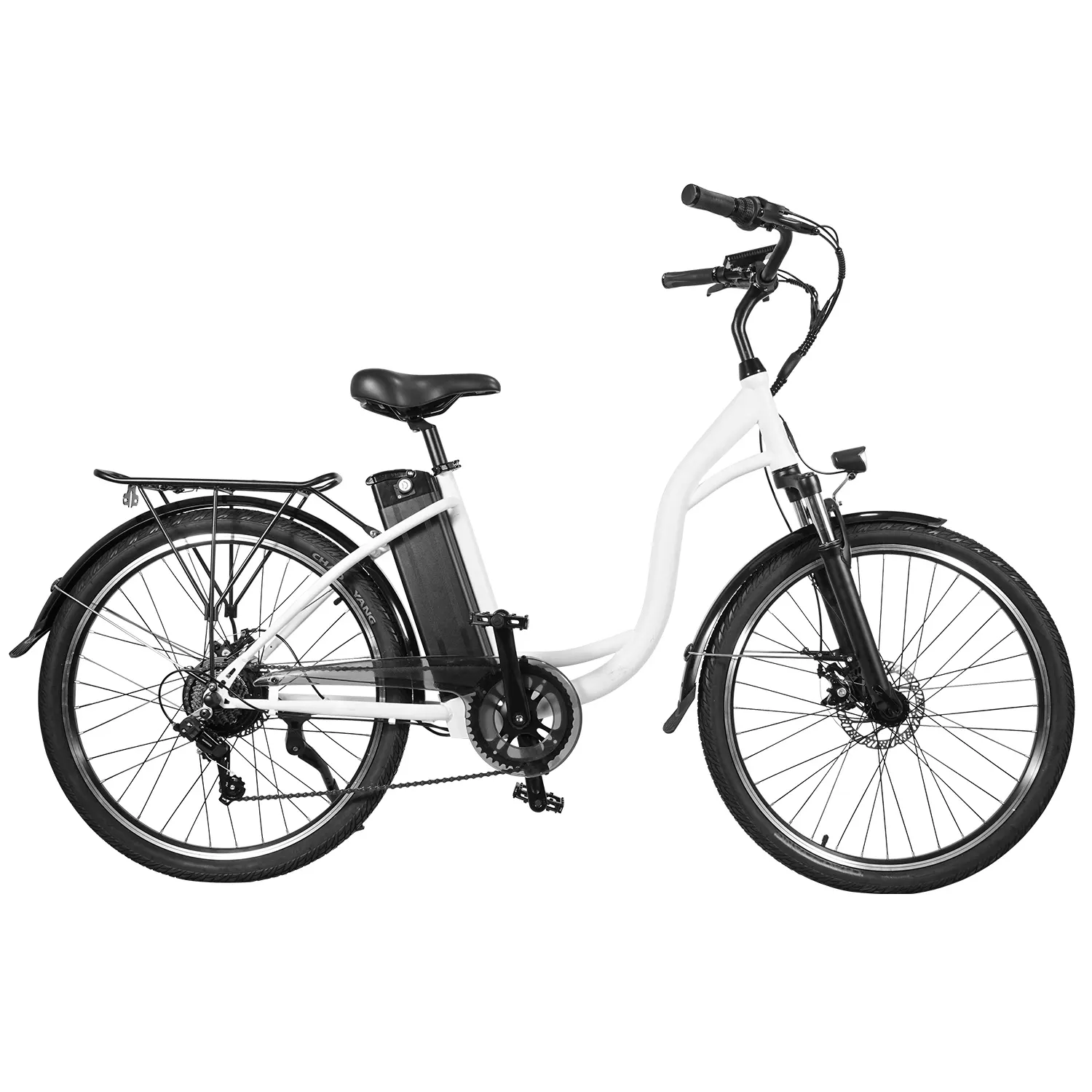
ເສັ້ນໃຍກາກບອນແມ່ນເປັນສິ່ງປະດິດສ້າງໃໝ່ໃນການເພີ່ມປະສິດທິພາບໃນການຂີ່ລົດໄຟຟ້າໃຊ້ປະຈຳວັນ, ເຊິ່ງໃຫ້ທາງເລືອກທີ່ແຂງແຮງແຕ່ມີນ້ຳຫນັກເບົາກ່ວາວັດຖຸດິບດັ້ງເດີມ. ຜູ້ຜະລິດນຳໃຊ້ເຕັກນິກການຂຶ້ນຮູບທີ່ທັນສະໄຫມເພື່ອຜະລິດຕົກຫຼັງຈາກເສັ້ນໃຍກາກບອນ, ເຮັດໃຫ້ນ້ຳຫນັກຫຼຸດລົງເຖິງ 30%. ຕົກຫຼັງປະເພດນີ້ບໍ່ພຽງແຕ່ຊ່ວຍເພີ່ມປະສິດທິພາບການຕ້ານລົມແຕ່ຍັງຊ່ວຍດູດຊຶມການສັ່ນສະເທືອນຈາກທາງ, ສະຫນອງຄວາມສະດວກສະບາຍໃນການຂີ່ລົດໄດ້ຢ່າງຫຼວງຫຼາຍ. ສຳລັບຜູ້ຂີ່ໃນເມືອງແລະຜູ້ຂີ່ທີ່ຕ້ອງການເດີນທາງໄລຍະທາງໄກ, ການນຳເອົາເສັ້ນໃຍກາກບອນເຂົ້າມາໃຊ້ງານໄດ້ປ່ຽນແປງປະສົບການໃນການຂີ່ລົດໄຟຟ້າໃຊ້ປະຈຳວັນໃຫ້ດີຂື້ນ, ເຮັດໃຫ້ການຂີ່ລົດໄດ້ຢ່າງລຽບລຽນແລະມີປະສິດທິພາບຫຼາຍຂື້ນ.
ມໍເຕີແຮງບິດສູງແມ່ນມີຄວາມຈໍາເປັນສໍາລັບລົດໄຟຟ້າລໍ້ຫນາທີ່ມັກຈະຂັບຜ່ານເຂດພູດອຍ. ມໍເຕີເຫຼົ່ານີ້ໃຫ້ການເຊື່ອມຕໍ່ແລະການຄວບຄຸມທີ່ດີກວ່າ, ສໍາຄັນສໍາລັບການປະຕິບັດໃນສະພາບທີ່ຫຍຸ້ງຍາກ. ຮູບແບບທີ່ທົນທານຂອງມໍເຕີເຫຼົ່ານີ້ອະນຸຍາດໃຫ້ຜູ້ຜະລິດເຊື່ອມຕໍ່ພວກມັນເຂົ້າກັບຕົວຖັງລົດໄຟຟ້າຢ່າງລຽບງ່າຍໂດຍບໍ່ຕ້ອງເສຍຍຮູບຮ່າງຫຼືການໃຊ້ງານ. ຂໍ້ມູນຊີ້ໃຫ້ເຫັນວ່າລົດໄຟຟ້າທີ່ມີມໍເຕີແຮງບິດສູງດີກວ່າລຸ້ນປົກກະຕູ 15% ໃນສະພາບທາງຊັນ, ຢືນຢັນປະສິດທິພາບຂອງພວກມັນໃນສະພາບການໃຊ້ງານທີ່ແທ້ຈິງ. ການພັດທະນາດ້ານເຕັກໂນໂລຊີມໍເຕີນີ້ກໍາລັງປ່ຽນແປງຄວາມດຶງດູດໃຈຂອງຕະຫຼາດສໍາລັບລົດໄຟຟ້າລໍ້ຫນາ, ນໍາເອົາທັງການປະຕິບັດທີ່ດີເລີດແລະຮູບຮ່າງທີ່ດຶງດູດ.
ລະບົບພະລັງງານແບບປັບປຸງກຳລັງປ່ຽນແປງລົດໄຟຟ້າທີ່ພັບໄດ້ໃຫ້ເປັນວິທີການຂົນສົ່ງທີ່ສາມາດພົກພາໄດ້ຫຼາຍຂຶ້ນ ແລະ ສະດວກສະບາຍຫຼາຍຂຶ້ນ. ການອອກແບບແບບປັບປຸງຊ່ວຍໃຫ້ສາມາດປ່ຽນແທນຖ່ານໄຟໄດ້ຢ່າງງ່າຍດາຍ, ລົດເວລາທີ່ລົດຈະຢຸດເຊົາການໃຊ້ງານ ແລະ ພັດທະນາຄວາມສະດວກສະບາຍຂອງຜູ້ໃຊ້ງານ. ລະບົບເຫຼົ່ານີ້ຖືກອອກແບບມາເພື່ອເພີ່ມປະສິດທິພາບໃນການແຈກຢາຍນ້ຳໜັກ, ຕອບສະໜອງຄວາມຕ້ອງການ ແລະ ຄວາມມັກຂອງຜູ້ຂີ່ທີ່ແຕກຕ່າງກັນ. ການສຳຫຼວດບວກທີ່ຜ່ານມາໄດ້ສະແດງໃຫ້ເຫັນວ່າ 70% ຂອງຜູ້ໃຊ້ງານມັກການອອກແບບແບບປັບປຸງເພື່ອຄວາມສະດວກໃນການເດີນທາງ, ເນັ້ນເຖິງຄວາມສຳຄັນຂອງມັນໃນອຸດສະຫະກຳ. ດ້ວຍການໃຫ້ຄວາມສຳຄັນກັບລະບົບພະລັງງານແບບປັບປຸງ, ຜູ້ຜະລິດກຳລັງຂັບເຄື່ອນການປະດິດສ້າງນະວັດຕະກຳໃນລົດໄຟຟ້າທີ່ພັບໄດ້, ຮັບປະກັນວ່າລົດຍັງຄົງມີຄວາມເໝາະສົມ ແລະ ສາມາດປັບຕົວໄດ້ສຳລັບຜູ້ໂດຍສານໃນຍຸກທັນສະໄໝ.
ການວິເຄາະພູມສັນຖານແບບທັນທີກໍາລັງປ່ຽນແປງຄຸນນະພາບຂອງການຂີ່ລົດໄຟຟ້າລ້າຍຫນາໂດຍການເປີດໃຊ້ລະບົບ AI ສາມາດປັບຄວາມຊ່ວຍເຫຼືອດ້ານພະລັງງານຕາມສະພາບແວດລ້ອມ. ໂດຍການປະເມີນຂໍ້ມູນເຊັ່ນ: ຄວາມຊັນ, ປະເພດພື້ນຜິວ, ແລະ ພະລັງງານຂອງຜູ້ຂີ່, ລະບົບອັດສະລິຍ໌ເຫຼົ່ານີ້ຈະປັບປຸງປະສິດທິພາບຂອງລົດໄຟຟ້າໃຫ້ດີຂຶ້ນ, ສົ່ງຜົນໃຫ້ການຂີ່ລົດໄດ້ຮັບຄວາມສະດວກສະບາຍແລະມີປະສິດທິພາບຫຼາຍຂຶ້ນ. ການສຶກສາຊີ້ໃຫ້ເຫັນເຖິງການເພີ່ມຂຶ້ນຢ່າງຫຼວງຫຼາຍເຖິງ 20% ໃນປະສິດທິພາບຂອງແບັດເຕີຣີໃນການຜະຈົນໄພໄລຍະໄກ, ຊຶ່ງເກີດຈາກການຈັດສັນພະລັງງານຢ່າງສະຫຼາດ. ເທັກໂນໂລຊີນີ້ເຮັດໃຫ້ຜູ້ຂີ່ສາມາດມີປະສົບການທີ່ຖືກປັບແຕ່ງໃຫ້ເຂົ້າກັບທັກສະ ແລະ ຄວາມມັກຂອງຕົນ, ຮັບປະກັນໃຫ້ການເດີນທາງແຕ່ລະຄັ້ງເປັນປະສົບການທີ່ຕື່ນເຕັ້ນ ແລະ ນ່າສົນໃຈ.
ການຮຽນຮູ້ຂອງເຄື່ອງຈັກ ກຳລັງປະຕິວັດລະບົບຈັດການແບັດເຕີຣີສຳລັບລົດຖີບໄຟຟ້າຂີ່ຂຶ້ນພູ ເຮັດໃຫ້ການຂີ່ລົດເປັນເວລາຍາວເທິງເສັ້ນທາງເປັນໄປໄດ້ໂດຍບໍ່ມີພາລະນ້ຳໜັກເພີ່ມ. ດ້ວຍການຄາດການແລະຄຸ້ມຄອງວົງຈອນຄາຍປະຈຸໄຟຢ່າງສະຫຼາດ, ລະບົບກົດລະບຽບການຮຽນຮູ້ຂອງເຄື່ອງຈັກຊ່ວຍໃຫ້ການຂີ່ລົດເປັນເວລາຍາວຂຶ້ນ ແລະຍືດອາຍຸການໃຊ້ງານແບັດເຕີຣີໄດ້ຫຼາຍເຖິງ 25%. ການພັດທະນານີ້ມີຄວາມສຳຄັນເປັນພິເສດຕໍ່ຜູ້ຂີ່ລົດຖີບພູ ທີ່ຂຶ້ນກັບກຳລັງໄຟຟ້າທີ່ສະໜອງຢ່າງຕໍ່ເນື່ອງເພື່ອໃຫ້ໄດ້ປະສົບການທີ່ເຊື່ອຖືໄດ້ເທິງເສັ້ນທາງທີ່ມີຄວາມຫຍຸ້ງຍາກ. ສຳລັບສິ່ງນີ້, ນະວະນຳພັດທະນາເຫຼົ່ານີ້ຮັບປະກັນວ່າຜູ້ຂີ່ລົດສາມາດເລີ່ມຕົ້ນການຂີ່ເປັນເສັ້ນທາງຍາວດ້ວຍຄວາມໝັ້ນໃຈ, ຮູ້ດີວ່າລົດຖີບໄຟຟ້າຂອງເຂົາເຈົ້າຈະສະໜັບສະໜູນການຜະຈົນໄພທຸກກ້າວທາງ.
ເທກໂນໂລຊີການບໍາລຸງຮັກສາແບບຄາດການໄດ້ເພີ່ມປະສິດທິພາບໃນຄວາມສາມາດຂອງລົດຖີບໄຟຟ້າໂດຍການນໍາໃຊ້ການວິເຄາະຂໍ້ມູນເພື່ອຄາດຄະເນບັນຫາທີ່ອາດຈະເກີດຂຶ້ນ. ລະບົບອັດສະລິຍົກເລີດດັ່ງກ່າວຈະປະເມີນຮູບແບບການນໍາໃຊ້ແລະຄວາມສຶກຂອງຊິ້ນສ່ວນ ແລະ ແຈ້ງເຕືອນຜູ້ຂີ່ໃຫ້ຮັບການບໍາລຸງຮັກສາກ່ອນທີ່ຈະເກີດຄວາມເສຍຫາຍ, ສົ່ງຜົນໃຫ້ຫຼຸດລົງຢ່າງຫຼວງຫຼາຍໃນການຊໍາລຸດຊໍ້າແບບບໍ່ຄາດຄິດພ້ອມທັງຄ່າໃຊ້ຈ່າຍ. ຕົວຢ່າງເຊັ່ນ: ການທົດລອງໃຊ້ໂດຍຜູ້ໃຊ້ງານໄດ້ສະແດງໃຫ້ເຫັນການຫຼຸດລົງຂອງບັນຫາທີ່ກ່ຽວຂ້ອງກັບການບໍາລຸງຮັກສາຫຼາຍກ່ວາ 30% ໃນທາງກົງກັນຂ້າມກັບມາດຕະການຄາດການດັ່ງກ່າວ. ເທກໂນໂລຊີນີ້ໃຫ້ຄວາມສະຫງົບໃຈແກ່ຜູ້ຂີ່ລົດຖີບ ໂດຍຮັບປະກັນວ່າລົດຖີບໄຟຟ້າຂອງເຂົາເຈົ້າສາມາດເຮັດວຽກໄດ້ຢ່າງລຽນລ້ຽງ ແລະ ມີປະສິດທິພາບ ເຊິ່ງອະນຸຍາດໃຫ້ເຂົາເຈົ້າສາມາດສຸມໃສ່ຄວາມຕື່ນເຕັ້ນໃນການຂີ່ລົດຖີບ ແທນທີ່ຈະກັງວົນກ່ຽວກັບບັນຫາດ້ານເຄື່ອງຈັກ.
ແຜ່ນໂລຫະຮີໄຊເຄີນທີ່ສາມາດນຳກັບມາໃຊ້ໃໝ່ໄດ້ ກຳລັງຕອບສະໜອງຄວາມຕ້ອງການທີ່ເພີ່ມຂື້ນສຳລັບລົດຖີບໄຟຟ້າທີ່ເປັນມິດກັບສິ່ງແວດລ້ອມ. ການນຳໃຊ້ວັດຖຸດິບເຫຼົ່ານີ້ ຊ່ວຍຫຼຸດຜ່ອນຮ່ອງຮອຍຂອງກາກບອນ (carbon footprint) ທີ່ກ່ຽວຂ້ອງກັບຂະບວນການຜະລິດໄດ້ຢ່າງຫຼວງຫຼາຍ ເຊິ່ງເປັນການສົ່ງເສີມການຕໍ່ສູ້ຕ້ານກັບການປ່ຽນແປງສະພາບອາກາດ. ນະວັດຕະກຳດ້ານວັດຖຸດິບນີ້ ສອດຄ່ອງກັບແນວໂນ້ມທີ່ເພີ່ມຂື້ນຕໍ່ການຍືນຍົງ (sustainability), ໃນຂະນະທີ່ຜູ້ບໍລິໂພກມີຄວາມຕື່ນຕົວຫຼາຍຂື້ນກ່ຽວກັບຜົນກະທົບຕໍ່ສິ່ງແວດລ້ອມຂອງຜະລິດຕະພັນທີ່ພວກເຂົາຊື້. ການສຶກສາຊີ້ໃຫ້ເຫັນວ່າ ປະມານ 60% ຂອງຜູ້ບໍລິໂພກໃນປັດຈຸບັນມັກຍີ່ຫໍ້ທີ່ນຳໃຊ້ວັດຖຸດິບທີ່ຍືນຍົງໃນຜະລິດຕະພັນຂອງຕົນ, ເຊິ່ງເນັ້ນຫນັກເຖິງຄວາມສຳຄັນຂອງວິທີແກ້ໄຂທີ່ເປັນມິດກັບສິ່ງແວດລ້ອມໃນຕະຫຼາດໃນມື້ນີ້.
ອົງປະກອບທີ່ເພີ່ມຄຸນສົມບັດດ້ວຍແກຣຟີນ (Graphene) ແມ່ນເປັນການປະດິດສ້າງໃໝ່ໃນການອອກແບບລົດໄຟຟ້າມີລໍ້ຫນັກທີ່ມີນ້ຳໜັກເບົາ. ແກຣຟີນ (Graphene) ມີຊື່ສຽງໃນດ້ານຄວາມເຂັ້ມແຂງ ແລະ ນ້ຳໜັກເບົາ ສຳລັບການປັບປຸງປະສິດທິພາບ ແລະ ຄວາມຄົງທົນຂອງລົດຈັກເຫຼົ່ານີ້. ການຄົ້ນຄວ້າໄດ້ສະແດງໃຫ້ເຫັນວ່າ ແກຣຟີນ (Graphene) ສາມາດເຮັດໃຫ້ອົງປະກອບມີຄວາມເຂັ້ມແຂງຫຼາຍກວ່າທອງເຫຼັກເຖິງ 200 ເທົ່າ ໃນຂະນະທີ່ຍັງຄົງມີນ້ຳໜັກເບົາຢູ່. ໂດຍການນຳໃຊ້ວັດສະດຸນີ້, ຜູ້ຜະລິດສາມາດສ້າງແບບອອກແບບໃໝ່ທີ່ເພີ່ມຄວາມໄວ ແລະ ປະສິດທິພາບ ເຮັດໃຫ້ຜູ້ຂີ່ສາມາດເພີດເພີນກັບການຂີ່ລົດໄລຍະທາງໄກໂດຍມີຄວາມອິດເມື່ອຍໜ້ອຍລົງ. ວິທີແກ້ໄຂ້ໃໝ່ນີ້ມີສິ່ງທີ່ມີຄວາມເປັນໄປໄດ້ຫຼາຍໃນການປ່ຽນໂຊມການຂີ່ລົດ ໂດຍສະເພາະໃນເສັ້ນທາງທີ່ສຸດຍາກ.
ລະບົບການສາກໄຟທີ່ເຂົ້າກັນໄດ້ກັບແຜງແສງຕາເວັນ ກຳລັງຖືກພັດທະນາເປັນແນວທາງຍືນຍົງໃນການສາກໄຟລົດຖີບພັບໄຟຟ້າ. ລະບົບດັ່ງກ່າວໃຫ້ວິທີການທີ່ເປັນມິດຕໍ່ສິ່ງແວດລ້ອມໃນການຮັກສາພະລັງງານໃນຂະນະທີ່ເດີນທາງຢູ່ຕ່າງຫຼັງຄາເຮືອນ ແລະ ຫຼຸດການຂຶ້ນກັບເຄືອຂ່າຍໄຟຟ້າ. ຂໍ້ມູນຊີ້ໃຫ້ເຫັນວ່າ ການຜະສົມຜະສານເອົາເຕັກໂນໂລຊີແສງຕາເວັນສາມາດຂະຫຍາຍໄລຍະທາງຂອງລົດຖີບໄຟຟ້າໄດ້ເฉລີ່ຍເຖິງ 30% ເຖິງແມ່ນໃນສະພາບແສງນ້ອຍ. ການພັດທະນານີ້ສະທ້ອນໃຫ້ເຫັນເຖິງການຮັບເອົາແຫຼ່ງພະລັງງານຍືນຍົງໃນການຂົນສົ່ງສ່ວນບຸກຄົນທີ່ເພີ່ມຂຶ້ນ ແລະ ສອດຄ່ອງກັບແນວໂນ້ມໃນການນຳໃຊ້ພະລັງງານທີ່ສາມາດຕໍ່ replenish ໄດ້. ດ້ວຍການນຳໃຊ້ພະລັງງານແສງຕາເວັນ ນັກຂີ້ລົດຖີບສາມາດມີຄວາມເສລີພາບ ແລະ ຄວາມຍືດຫຍຸ່ນຫຼາຍຂຶ້ນ ເຮັດໃຫ້ລົດຖີບພັບໄຟຟ້າເປັນທາງເລືອກທີ່ດຶງດູດໃຈສຳລັບນັກເດີນທາງທີ່ໃຈຮ້າຍຕໍ່ສິ່ງແວດລ້ອມ.
ຂໍ້ກຳນົດສາກົນມີຜົນກະທົບຢ່າງຫຼວງຫຼາຍຕໍ່ການອອກແບບ ແລະ ການຜະລິດລົດຖີບໄຟຟ້າ, ໂດຍສະເພາະຂອບເຂດພະລັງງານຂອງເຄື່ອງຈັກ. ການປະຕິບັດຕາມຂໍ້ກຳນົດເຫຼົ່ານີ້ເປັນສິ່ງສຳຄັນສຳລັບຜູ້ຜະລິດເພື່ອໃຫ້ປະຕິບັດຕາມກົດລະບຽບ ແລະ ຫຼີກລ່ຽງຄ່າປັບໃໝ່. ຕົວຢ່າງເຊັ່ນ: ຂໍ້ມູນສະຖິຕິສະແດງໃຫ້ເຫັນເຖິງຄວາມແຕກຕ່າງຂອງຂໍ້ກຳນົດໃນແຕ່ລະປະເທດ; ບາງພື້ນທີ່ອະນຸຍາດໃຫ້ໃຊ້ພະລັງງານເຄື່ອງຈັກສູງເຖິງ 750W, ໃນຂະນະທີ່ພື້ນທີ່ອື່ນຈຳກັດພຽງ 250W. ການເຂົ້າໃຈຂອບເຂດເຫຼົ່ານີ້ເປັນສິ່ງສຳຄັນຍ້ອນມັນກຳນົດຂອບເຂດການອອກແບບເຄື່ອງຈັກ ແລະ ຮັບປະກັນຄວາມສອດຄ່ອງກັນໃນການປະຕິບັດດ້ານຄວາມປອດໄພ. ນອກຈາກນັ້ນ, ການປະຕິບັດຕາມມາດຕະຖານເຫຼົ່ານີ້ບໍ່ພຽງແຕ່ຊ່ວຍສົ່ງເສີມຄວາມປອດໄພຂອງຜູ້ຂີ່ເທົ່ານັ້ນ, ແຕ່ຍັງມີຜົນກະທົບຕໍ່ການµຕິສິນໃຈຂອງຜູ້ບໍລິໂພກໂດຍໃຫ້ຄວາມອຸ່ນໃຈໃນເລື່ອງການປະຕິບັດຕາມກົດລະບຽບ ແລະ ຄວາມຮັບປະກັນດ້ານຄວາມປອດໄພ.
ນະໂຍບາຍການເຂົ້າເຖິງທາງດ້ານເຕັກນິກມີຜົນກະທົບໂດຍກົງຕໍ່ຄວາມສາມາດຂອງລົດໄຟຟ້າມີລໍ້ຫນາ, ໂດຍສະເພາະລະບົບ suspension ຂອງມັນ. ຄຳແນະນຳຂອງທ້ອງຖິ່ນ ແລະ ແຫ່ງຊາດ ມັກຈະກຳນົດເຂດທີ່ລົດຈັກເຫຼົ່ານີ້ສາມາດເຂົ້າເຖິງໄດ້, ສົ່ງຜົນກະທົບຕໍ່ຂະບວນການພັດທະນາລົດຂອງຜູ້ຜະລິດ. ດັ່ງນັ້ນ, ຜູ້ຜະລິດລົດ e-MTB ກຳລັງປັບປຸງລະບົບ suspension ທີ່ສາມາດປັບໄດ້ເພື່ອໃຫ້ເຂົ້າກັນກັບຂໍ້ກຳນົດເຫຼົ່ານີ້, ຮັບປະກັນວ່າການອອກແບບຂອງເຂົາເຈົ້າຕອບສະຫນອງຄວາມຕ້ອງການຂອງຜູ້ຂີ່ສຳລັບຄວາມສາມາດໃນການນຳໃຊ້ໄດ້ຫຼາກຫຼາຍໃນຂະນະທີ່ຍັງຄົງຢູ່ໃນຂອບເຂດນະໂຍບາຍການເຂົ້າເຖິງ. ຫຼັກຖານຊີ້ໃຫ້ເຫັນວ່າລົດໄຟຟ້າທີ່ອອກແບບມາພ້ອມກັບຄຳນຶງເຖິງການເຂົ້າເຖິງທາງດ້ານເຕັກນິກສາມາດເພີ່ມຄວາມພໍໃຈຂອງຜູ້ຂີ່ລົດໄດ້ໂດຍການປັບປຸງຄວາມປອດໄພ ແລະ ປັບປຸງປະສົບການໃນການຂີ່ລົດໂດຍລວມ.
ມາດຕະການຄວາມປອດໄພມີບົດບາດສໍາຄັນໃນການພັດທະນາລະບົບທ່ຽງທາງທີ່ເພີ່ມຂີດຂະໜານ AI ສໍາລັບລົດຖີບໄຟຟ້າ, ຮັບປະກັນທັງການປະຕິບັດຕາມຂໍ້ກໍານົດແລະຄວາມໄວ້ວາງໃຈຂອງສາທາລະນະຊົນ. ນະວະນິຕະກໍາເຫຼົ່ານີ້ຕ້ອງປະຕິບັດຕາມມາດຕະຖານຄວາມປອດໄພທີ່ກໍານົດໄວ້, ຜະສົມຜະສານຄຸນນະສົມບັດທີ່ຈໍາເປັນເຊັ່ນການຫຼີກລ່ຽງສິ່ງກີດຂວາງ ແລະ ການແຈ້ງເຕືອນການชน, ສິ່ງທີ່ເພີ່ມຄວາມໝັ້ນໃຈຂອງຜູ້ຂີ່ຢ່າງຫຼວງຫຼາຍ. ການທົດລອງໄດ້ຊີ້ໃຫ້ເຫັນວ່າການປະຕິບັດຕາມມາດຕະການເຫຼົ່ານີ້ສາມາດຫຼຸດຜ່ອນອັດຕາອຸບັດຕິເຫດລົງໄດ້ເຖິງ 40%. ດັ່ງນັ້ນ, ການຜະສົມຄຸນນະສົມບັດຄວາມປອດໄພທີ່ເຂັ້ມງວດເຂົ້າໃນລະບົບ AI ບໍ່ພຽງແຕ່ເປັນຄວາມຈໍາເປັນຕາມກົດລະບຽບເທົ່ານັ້ນ, ແຕ່ຍັງເປັນສ່ວນສໍາຄັນໃນການສົ່ງເສີມຄວາມໄວ້ວາງໃຈຂອງຜູ້ບໍລິໂພກ ແລະ ປັບປຸງຄວາມປອດໄພໂດຍລວມຂອງລົດຖີບໄຟຟ້າ.
 Hot News
Hot News2024-11-11
2024-11-04
2024-08-30
2024-08-23
2024-08-16
2024-08-09